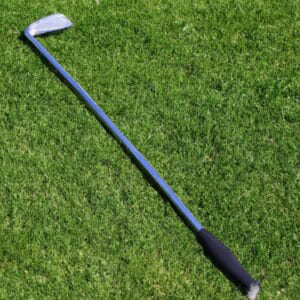Last Updated on June 9, 2023
Golf is a popular sport, but it’s also an expensive one. If you’re thinking of taking up golfing, or if you’re already an avid golfer, then you know that buying the right clubs can be a big investment. But how much do your new clubs actually weigh? With so many different types and sizes to choose from, knowing exactly how much weight you’ll have to lug around on the course is important. In this article, we’ll take a look at what makes golf clubs so heavy – and just how much they really weigh! Keep reading to find out more about the heft of these essential pieces of golf equipment.
Factors That Influence Weight
The weight of golf clubs is determined by various factors. Clubs length, shaft materials, clubhead design, grip size and swing weight all contribute to the overall weight of a set of golf clubs. Generally speaking, longer clubs will weigh more than shorter ones due to their increased material use. Shafts made from graphite are lighter than those constructed with steel; this also affects the total weight of each club. Additionally, certain clubhead designs will be heavier or lighter depending on the material used in their construction. Grip sizes can vary considerably and affect the overall feel and balance of a golf club when swung – larger grips add additional grams of weight to a club’s total mass. Lastly, some players may opt for different ‘swing weights’, which change how heavy a club feels and how it behaves during play. All these features come together to form a unique combination that determines an individual’s preferred golfing equipment setup. Weight plays an important role in optimising performance and comfort when playing golf and should not be overlooked when assembling a bag of clubs.
Types of Clubs and Their Weights
The weight of golf clubs can vary greatly, depending on the type and size. Putters typically weigh from 350 to 500 grams, while drivers usually range between 400 and 440 grams. Irons are heavier than other clubs, with a typical weight ranging from 620 to 810 grams. Wedges have similar weights as irons but tend to be slightly lighter due to their shorter length and bounce angle. Fairway woods generally come in at around 280-360 grams.
In summary, the weight of golf clubs can differ significantly by type and size. Putters are generally lightest, followed by drivers, wedges, fairway woods, and finally, irons which are heaviest. Choosing the right club for your needs is important to ensure you get the maximum performance out of each shot.
Standard Shaft Lengths and Weights

The standard shaft length of a golf club is 44.5 inches, which makes up the majority of clubs used on the market today. It’s important to note that different manufacturers have their own recommended lengths for certain clubs in order to optimise performance and accuracy while playing. The weight of the shaft itself typically ranges from 40-50 grams depending on its construction material and design.
When it comes to overall club weight, this includes both the shaft and head combined. Generally speaking, the average iron set will weigh between 2–3 pounds, whereas drivers are usually heavier at around 3–4 pounds due to their larger heads. Here’s a quick list of some common items and associated weights:
- Driver: 300-340g
- Iron Set: 1.6kg – 2.2kg
- Putter: 500-600g
- Wedge Set: 600-750g
It’s important to take into consideration what type of club you’re using when selecting an appropriate length or weight, as this can affect your game significantly. Factors such as swing speed, height, body type and skill level should all be taken into account so you can get the best out of your equipment possible!
Different Grips and Their Weights
The size, weight, material, and shape of a golf club’s grip are all important aspects to consider when choosing the right one. Different types of grips can be made from rubber or fabric-like materials, depending on the golfer’s preference. The weight of the grip is determined by how much material it is composed of; lighter grips help with control, while heavier ones provide greater stability. Additionally, they come in various sizes that fit comfortably in your hands – a must for any serious player.
Grip shapes also play an essential role in a golfer’s performance. While round grips offer comfort and balance during swings, ribbed ones provide extra traction to ensure better accuracy. On the other hand, pistol-shaped grips add more power behind each swing but may cause fatigue quicker due to their larger size. No matter which types you choose, make sure it feels comfortable enough for long practice sessions. All these factors should be taken into account before selecting the perfect grip for your clubs!
Weighted Golf Clubs

Golf clubs range in weight and come in a variety of sizes. The total weight of the golf club is determined by the combination of its head, shaft, and grip weights. Club heads typically weigh between 200-300 grams, while shafts can vary from 50 to 125 grams depending on their length and material. Grips usually run around 40-50 grams.
When it comes to weighted golf clubs, these are generally heavier than traditional models and offer greater stability during your swing due to their extra mass. Weighted clubs can be either the perimeter or internally weighted, with their added mass coming from tungsten powder inside the club head or through the additional lead tape on the outside edge of the club face. This increased weight helps generate more momentum for better accuracy when hitting off the tee or out of bunkers as well as providing more control over spin rate on approach shots into greens.
Weighted golf clubs provide an alternative option for players who want a little extra heft in their grips but don’t necessarily need longer lengths or stiffer shafts that often accompany custom fitting sessions. With so many options available now, anyone looking to improve their game should definitely consider investing in some quality weighted golf clubs today!
How to Calculate the Total Weight of Your Set
Now that you know about the importance of weighted golf clubs, it’s time to find out how much your set weighs. Calculating the total weight of your golf set is a simple process. The first step is to determine each individual club’s weight, which varies depending on its make and model. You can do this by weighing each one separately or looking up their specifications online. Once you have all the club weights, simply add them together to get an accurate estimate of your golf set’s total weight. To further refine your calculation, don’t forget to factor in the weight of any accessories, such as head covers or grips. Knowing exactly how much your golf set weighs will help ensure you purchase the right equipment for yourself and maximise potential performance gains due to proper swing mechanics.
Benefits of Lighter Golf Clubs
Lighter golf clubs provide many advantages to the golfer. They can add increased distance and improved accuracy with every swing due to their lighter weight. With a lighter club, it’s also easier for players to generate more speed during their swings as well. This allows them to hit the ball farther and straighter than they would be able to otherwise.
The benefits of using lighter golf clubs don’t end there, either. A lighter club is much less likely to cause fatigue in the player after several hours of practice or play on the course. This makes it possible for players to keep playing longer without needing breaks in between rounds or shots, which leads to better overall performance over time. Moreover, larger-headed drivers are now being manufactured that are lightweight, making them even easier to control during your shot.
Lightweight golf clubs offer many benefits that help improve a golfer’s game. Increased distances, improved accuracy, faster speeds, and reduced fatigue make these clubs an excellent choice for anyone looking to take their game up a notch.
Advantages of Heavier Golf Clubs

The advantages of heavier golf clubs cannot be overstated. Heavier clubs offer greater stability and help to generate extra power with each swing. This can result in improved accuracy, as the club is less likely to deviate from its intended path due to external forces like wind or rain. Additionally, because they require less effort for each shot, heavier clubs reduce fatigue and allow players to maintain their focus throughout a round of golf.
By providing increased stability and reduced fatigue, heavy golf clubs are an ideal tool for any golfer looking to improve their game. In addition to feeling more confident on the course, players will also benefit from longer drives and more consistent results. Ultimately, using heavier golf clubs can make all the difference when it comes time for competition play.
Frequently Asked Questions
What Type of Material Are Golf Clubs Made of?
Golf clubs are typically made of a variety of materials, and it depends on the type of club. Generally, golf clubs will have either graphite or steel shafts, with titanium heads and composite materials used in hybrid clubs. Graphite shafts are lighter weight than steel options which gives players greater distance when they swing. Steel shafts are more durable but often less expensive than graphite models. Titanium heads provide a unique combination of power, accuracy, and forgiveness that is suitable for all levels of players. Finally, composite materials such as carbon fibre or Kevlar can be found in many hybrid clubs to help customise performance based on individual needs:
- Graphite Shafts
- Steel Shafts
- Titanium Heads
- Composite Materials
The material chosen to construct a golf club affects playability as well as aesthetics. For example, if you’re looking for maximum distance, then a graphite shaft would be your best bet because it offers a lightweight design without sacrificing strength or durability. On the other hand, if you’re just starting out with golf and want something economical yet reliable enough for practice use, steel shafts may be ideal. Meanwhile, those who seek precision and control should look into titanium-headed clubs, while experienced players may benefit from customising their set with hybrids featuring composite materials like carbon fibre or Kevlar. Ultimately choosing the right material boils down to personal preference and desired performance characteristics, so consider what works best for you before making any decisions!
What Is the Average Length of a Golf Club?
Golf clubs come in a variety of lengths, and the average golf club length is determined by several factors. One factor to consider when assessing what the average length of a golf club should be is the golfer’s height and arm length. Generally speaking, taller golfers typically require longer clubs than shorter players do.
The standard golf club length range for men starts at 40 inches (1 meter) and can reach up to 48 inches (1.2 meters). Women’s clubs are slightly shorter, with a range between 37-43 inches (.94-.11 meters). It’s important to note that children’s clubs may also differ in size from adults’, as they tend to use more compact variations depending on their age.
When determining which size of golf club you need, there are several options available:
- Standard Golf Club Length:
- Men: 40-48 inches (1-1.2 meters)
- Women: 37-43 inches (.9-1.11 meters)
- Children’s Clubs: Vary based on age and style
- Custom Fitted Clubs: Allow players to customise shaft flexes, head styles, lie angles, etc., all tailored to fit them specifically
No matter which type of golf club you choose, it’s essential to make sure your equipment is properly fitted for you so that you can get the most out of each swing. With the right fit and practice, you’ll see an improvement in your game no matter what size or type of golf clubs you have!
Conclusion
In conclusion, golf clubs can vary significantly in weight depending on the material they’re made of and their length. Generally speaking, a standard set of golf clubs will range anywhere from 10-15 pounds. Of course, there are special types of golf clubs that may be heavier or lighter than this range. Regardless of how much they weigh, playing golf has numerous health benefits, such as improved muscle tone, increased cardiovascular fitness, better balance and coordination, enhanced mental alertness and social interaction with others who share your passion for the game. All these factors make playing golf an enjoyable activity, both physically and mentally. So if you’re looking to get started in the sport or want to brush up on your skills, it’s important to consider investing in quality equipment like well-crafted golf clubs so you can reap all the benefits that come with it!



